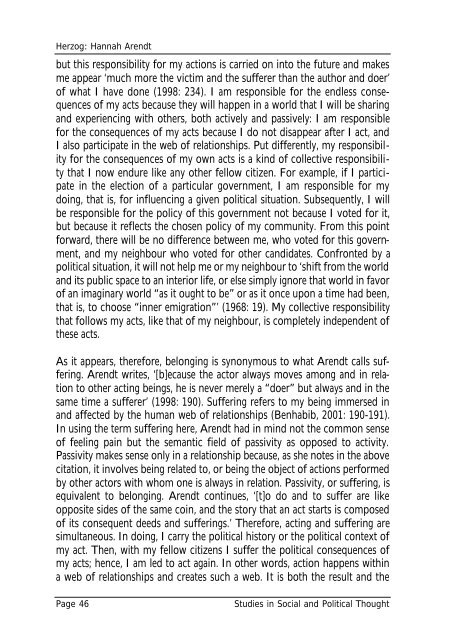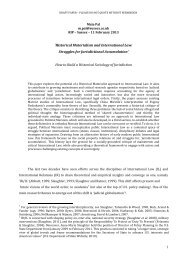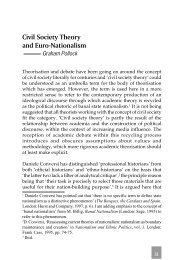Hannah Arendt's Concept of Responsibility - University of Sussex
Hannah Arendt's Concept of Responsibility - University of Sussex
Hannah Arendt's Concept of Responsibility - University of Sussex
Create successful ePaper yourself
Turn your PDF publications into a flip-book with our unique Google optimized e-Paper software.
Herzog: <strong>Hannah</strong> Arendt<br />
but this responsibility for my actions is carried on into the future and makes<br />
me appear ‘much more the victim and the sufferer than the author and doer’<br />
<strong>of</strong> what I have done (1998: 234). I am responsible for the endless consequences<br />
<strong>of</strong> my acts because they will happen in a world that I will be sharing<br />
and experiencing with others, both actively and passively: I am responsible<br />
for the consequences <strong>of</strong> my acts because I do not disappear after I act, and<br />
I also participate in the web <strong>of</strong> relationships. Put differently, my responsibility<br />
for the consequences <strong>of</strong> my own acts is a kind <strong>of</strong> collective responsibility<br />
that I now endure like any other fellow citizen. For example, if I participate<br />
in the election <strong>of</strong> a particular government, I am responsible for my<br />
doing, that is, for influencing a given political situation. Subsequently, I will<br />
be responsible for the policy <strong>of</strong> this government not because I voted for it,<br />
but because it reflects the chosen policy <strong>of</strong> my community. From this point<br />
forward, there will be no difference between me, who voted for this government,<br />
and my neighbour who voted for other candidates. Confronted by a<br />
political situation, it will not help me or my neighbour to ‘shift from the world<br />
and its public space to an interior life, or else simply ignore that world in favor<br />
<strong>of</strong> an imaginary world “as it ought to be” or as it once upon a time had been,<br />
that is, to choose “inner emigration”’ (1968: 19). My collective responsibility<br />
that follows my acts, like that <strong>of</strong> my neighbour, is completely independent <strong>of</strong><br />
these acts.<br />
As it appears, therefore, belonging is synonymous to what Arendt calls suffering.<br />
Arendt writes, ‘[b]ecause the actor always moves among and in relation<br />
to other acting beings, he is never merely a “doer” but always and in the<br />
same time a sufferer’ (1998: 190). Suffering refers to my being immersed in<br />
and affected by the human web <strong>of</strong> relationships (Benhabib, 2001: 190-191).<br />
In using the term suffering here, Arendt had in mind not the common sense<br />
<strong>of</strong> feeling pain but the semantic field <strong>of</strong> passivity as opposed to activity.<br />
Passivity makes sense only in a relationship because, as she notes in the above<br />
citation, it involves being related to, or being the object <strong>of</strong> actions performed<br />
by other actors with whom one is always in relation. Passivity, or suffering, is<br />
equivalent to belonging. Arendt continues, ‘[t]o do and to suffer are like<br />
opposite sides <strong>of</strong> the same coin, and the story that an act starts is composed<br />
<strong>of</strong> its consequent deeds and sufferings.’ Therefore, acting and suffering are<br />
simultaneous. In doing, I carry the political history or the political context <strong>of</strong><br />
my act. Then, with my fellow citizens I suffer the political consequences <strong>of</strong><br />
my acts; hence, I am led to act again. In other words, action happens within<br />
a web <strong>of</strong> relationships and creates such a web. It is both the result and the<br />
Page 46<br />
Studies in Social and Political Thought
















